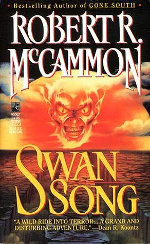Story of Your Arrival
Ted Chiang’s 1998 novella Story of Your Life is an unlikely candidate for a movie adaptation. I wouldn’t go so far as to call it “unfilmable”, but its concentration on an unromanticized depiction of a mother’s relationship with her daughter, intercut with the mother’s pragmatic attempts to translate language from an alien species visiting earth, doesn’t seem particularly cinematic. So when I heard that director Denis Villeneuve was making an adaptation, I was curious to see what would come of it. Villeneuve has done well for himself in his past few outings, which gave a glimmer of hope that someone would get it right. Eric Heisserer wrote the screenplay, but his filmography did little to instill confidence. As it turns out, I’m quite pleased with the result. It’s a different story, to be sure, but that it captures even a little of what makes Chiang’s story so interesting is enough to make it one of the better films of the year (and one of the few movies to capture the experience of reading science fiction). It won’t really be possible to comment further without Spoilers, so here be your warning.
Arrival was marketed in a way that made it look like another alien invasion movie. Even the film’s title seems to indicate a shift in intent; Chiang’s story leans heavier on the mother/daughter relationship, and the title reinforces that. Arrival focuses more on the aliens and adds in a geopolitical subplot that isn’t present in the original story at all. The mother/daughter stuff is still there, and indeed, the opening of the movie leans heavily in that direction. But there are changes, changes that seem subtle at first, but which yield a very different outcome. Abigail Nussbaum noticed this too:
To someone familiar with the story, there is a hint early on in Arrival of its shift in priorities and premise. The film opens with a series of flashes to the relationship between linguist Louise Banks (Amy Adams) and her daughter Hannah, culminating in Hannah’s death, in her early adulthood, from a disease. In the story, Hannah dies in a climbing accident. The change initially seems pointless–or perhaps yet another indication that Hollywood thinks cancer is inherently more dramatic than any other form of tragedy–and then troubling. In the story, the point of Hannah’s death being accidental is that it is easily preventable. Someone with knowledge of the future–as Louise will eventually become–could keep it from happening by saying a few words. The point of “Story of Your Life” is to explain why Louise doesn’t do this. Making Hannah’s death something that Louise can’t prevent seems, in the film’s early minutes, like an odd bit of point-missing.
I don’t find the shift nearly as “troubling” as Nussbaum, nor is her interpretation and extrapolation of the story’s themes the only one (for instance, I don’t think we really know that her daughter’s death is easily preventable, but I think that ambiguity is the point and we are meant to consider that), but it does seem clear that Villeneuve and Heisserer deliberately made these changes to the story in order to emphasize some different themes.
This is always the trap of the adaptation. It’s possible to be too faithful to the original and generally doom yourself to an inferior experience. But if you stray too far, you end up with something completely disconnected from the original. The movie makes changes and is less ambiguous, but it does still inspire the same questions in my head. Chiang’s story is a subtle examination of free will and determinism, the movie is more forthright and lays things out clearer, but still raises those questions. And frankly, I don’t have the answers. I think that’s the point.
The film certainly isn’t perfect. Some of the exposition is awkwardly presented, in particular by our heroine’s scientist counterpart, Ian Donnelly (Jeremy Renner), who at one point delivers a voice-over that feels wholly out of place, even as it lays out some important ideas. Later he simply blurts out the Sapir-Whorf hypothesis that learning the structure of a language affects the way you think and perceive the world, which is the key to the entire story. This is par for the SF adaptation course though, and this movie actually comports itself well on that scale. Villeneuve does well visually too. Towards the beginning of the film, we spend a fair amount of time entering the ship, where physics works differently. It’s a nice visual representation of the linguistic shift of perspective the character is about to go through. Is it as good as Chiang’s use of past, present, and future tense in the story? Probably not, but it does represent some thought put into adapting those ideas.
The added geopoltical subplot feels like it was probably necessary in order to get this film made, and it proceeds along more conventional lines. That said, it is well executed and dovetails nicely with the final twist. Its message of unity and harmony is well timed with world events, which doesn’t hurt, and it never takes away from the core of the story. It also doesn’t turn this into an action movie, however much the marketing wants you to believe it would be so. This is much to its strength.
This is a good adaptation of a subtle and difficult story, and one of the best movies of the year. Filmic SF so rarely captures the sense of wonder present in so much of its written counterpart that even if the adaptation isn’t absolutely perfect, it still puts this movie in the top tier of SF films of all time (at least, in my book). You will probably see this near the top of my top 10 list this year, and I’m hoping it garners enough attention in Hollywood to yield more attempts at this sort of thing.
